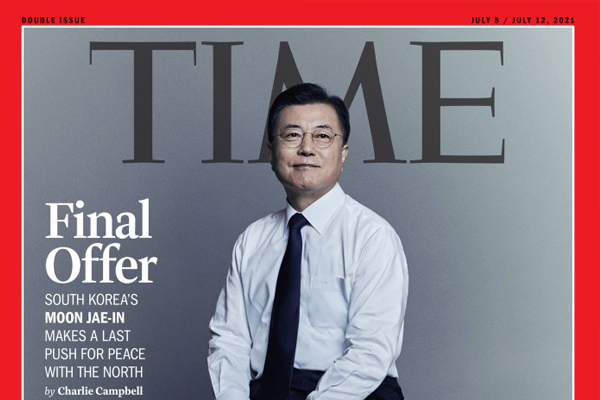In a move that shocked the public, South Korean President Moon Jae-in skipped an event commemorating the 71st anniversary of the outbreak of the Korean War on June 25, only to praise the North Korean dictator in an interview with international media. His “no-show” is drawing strong backlash from conservative politicians, who are calling it another attempt by Moon to appease the North.
Moon, who came into power in May 2017, attended the Korean War event only once, back in 2020. At that time, he said, “The two Koreas’ competition over political and economic systems already ended a long time ago.” He added that, “We do not have any intention to force our system on the North. We pursue peace and intend to live well together. We will continuously search for routes that are mutually beneficial for both Koreas through peace. Before speaking of reunification, I hope that we can become friendly neighbors first.”
This year, Moon did not even post anything about the Korean War on his social media. The Blue House told media outlets that the decision not to attend the event was made after considering various factors including the fact that this year’s event was held in Busan, a southeastern city far from the capital city Seoul, and followed the previous custom in which the Prime Minister attends the event as the main host. This was the first time that the event was held in Busan, which was the temporary capital of the South during the Korean War. It was held at the Busan Cinema Center, a location used as an airbase during the war.
One of the reasons why Moon’s decision to not to attend the ceremony is receiving such attention is due to the Time Magazine interview released on June 24, a day before the anniversary ceremony. When asked about Kim Jong-un’s character, Moon found him “very honest … very enthusiastic [and] one with strong determination” who has “a good idea of what is going on around the world,” according to the report. The magazine added the following lines after Moon’s comments.
“But lest we forget, this is the same man who murdered his uncle and half-brother in cold blood and, according to a landmark 2014 U.N. Commission of Inquiry, presides over “crimes against humanity” including extermination, torture, rape and causing prolonged starvation. For many North Korea watchers, Moon’s steadfast defense of Kim is verging on delusional.”
Moon also said that the North Koreans’ “eyes and attitudes” showed that they “strongly aspire for peace.” “I could see for myself that North Korea has completely changed … and is doing everything possible to develop.” Many experts have continuously warned that such wishful thinking will not help negotiations with the North.
North Korean nuclear and missile capabilities have not been reduced regardless of Moon’s so-called “Korean Peninsula Peace Process.” In fact, the Stockholm International Peace Research Institute (SIPRI) announced earlier this month that it is estimated that Pyongyang’s number of nuclear warheads rose from 30-40 in 2020 to the 40-50 range this year. “North Korea continues to enhance its military nuclear program as a central element of its national security strategy,” the think tank said.
Members from the main opposition People Power Party (PPP) criticized Moon for his comments, which could be interpreted as praising North Korea and its leader Kim Jong-un.
“I cannot imagine how miserable the souls of all the fallen heroes who died protecting our homeland would feel after watching our country’s president praising the leader of the enemy state that continues to threaten our people’s lives,” said Kim Ki-hyun, floor leader of the PPP. “It does not change the fact that Kim is a cruel dictator who publicly executed his uncle and poisoned his half-brother to death to keep his power. The fact that he is the most dangerous person who continues to seek opportunities to invade South Korea by threatening us with their nuclear weapons cannot be changed.”
Hwang Bo Seung-hee, the spokesperson of the PPP, argued that describing Kim Jong-un as a good and wise leader ahead of June 25 is something that deeply hurts the fallen soldiers and their family members.
Another member of the PPP, Kim Seok-ki said, “Time magazine clarified the fact that Kim Jong-un is responsible for killing his uncle and half-brother, and it appears the magazine rebuked our president’s comments.” He added that, “It is a very embarrassing and internationally humiliating moment for us.”
Previously, many questioned Moon’s historical views on the Korean War when he made a speech at the United Nations in 2017. The problematic sentences in the speech were, “this civil war, which evolved into an international war, devastated the lives of countless people,” and “the Korean War, a war that began as an offshoot of the larger Cold War conflict, continues to this day.”
These are the kind of lines typically used by leftist scholars in South Korea. Describing the Korean War as a “civil war” or “internal war” obscures who the perpetrators were. There are still many scholars who argue that internal conflicts between the North and the South expanded into war even after various declassified documents show that North Korean officials met with their counterparts in the Soviet Union and China asking for full support while preparing for an invasion. Moon also argued that the war began as part of the global Cold War. This is another line which South Korean leftists like to use to make the war look like a proxy war between superpowers, dismissing North Korea’s responsibility for the invasion.


